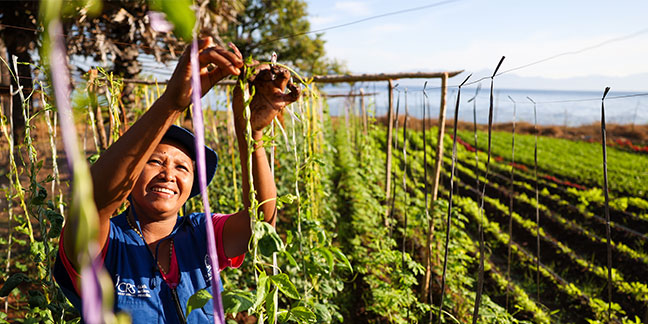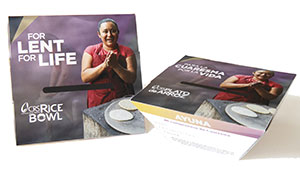 Evita Tiro Wada adjusts a drip irrigation system in Indonesia. (Photos by Benny Manser | Catholic Relief Services)The Bread of Life – which we receive through the Eucharist – fills us with God’s grace and love. The Eucharist feeds us. It nourishes us. It unites us with God and one another as members of the same Body of Christ. And it is through our communion with the Bread of Life that we are called to share bread for life.
Evita Tiro Wada adjusts a drip irrigation system in Indonesia. (Photos by Benny Manser | Catholic Relief Services)The Bread of Life – which we receive through the Eucharist – fills us with God’s grace and love. The Eucharist feeds us. It nourishes us. It unites us with God and one another as members of the same Body of Christ. And it is through our communion with the Bread of Life that we are called to share bread for life.
Jesus tells us, “I am the bread of life; whoever comes to me will never hunger, and whoever believes in me will never thirst.” When we receive Jesus through the Eucharist, our hearts are filled with His love and the call to share that love with our sisters and brothers in need around the world.
During Lent, we’re invited to act on this call through our Catholic tradition of prayer, fasting and almsgiving. When we practice these Lenten pillars, we enter a living relationship and unite our hearts with God and with one another.
With Catholic Relief Services’ Rice Bowl campaign, the Lenten pillars will guide us to encounter Christ through our global family in Uganda, El Salvador and Indonesia – through our sisters and brothers who are finding ways to overcome hunger and adapt to the impacts of climate change.
CRS Rice Bowl benefits Catholic Relief Services, the official international humanitarian agency of the Catholic community in the United States. The agency alleviates suffering and provides assistance to people in need in more than 100 countries, without regard to race, religion or nationality.
Every Lent since 1975, millions of Catholics across the United States have come together through CRS Rice Bowl to support people struggling with hunger and poverty – both at home and around the world. And because hunger and poverty continue to be some of the most critical concerns of our time, we’re still needed to make a difference.
— CRS
STORY OF HOPE: Indonesia
 Located in Southeast Asia between the Pacific and Indian Oceans, Indonesia has beautiful beaches, diverse cultures and nearly 280 million people – the fourth highest population in the world.
Located in Southeast Asia between the Pacific and Indian Oceans, Indonesia has beautiful beaches, diverse cultures and nearly 280 million people – the fourth highest population in the world.
Many of the country’s more than 17,000 islands are in the Ring of Fire, a region around the rim of the Pacific Ocean where volcanic eruptions and earthquakes are common.
Climate-related disasters such as cyclones also threaten the islands and are becoming more frequent and destructive.
Strong rains and wind from these storms – combined with long periods without rain, called drought – make it difficult for people like Evita Tiro Wada to grow food. Evita and her family live on Flores Island, where she keeps a home garden for food and income.
To help her family and community become more resilient against natural disasters and have more reliable access to food, Evita participated in a Catholic Relief Services’ program, through which she joined a disaster preparedness group.
The group helps their community stay safe during emergencies like cyclones and earthquakes. They created a system to warn people to evacuate and identified evacuation routes, assembly points and resources they can use during a crisis.
The group also maintains a community garden. They grow vegetables like beans, eggplant and water spinach, and use a drip irrigation system to conserve water so the vegetables can grow even during a drought.
Evita says, “When I first joined the village disaster preparedness group, I thought, ‘What will I do or give to help the community?’ After I’ve been involved, I see the benefits of what the community and I did.”
Your Lenten alms change lives globally and locally:
 of your CRS Rice Bowl donation supports CRS’ work around the world.
of your CRS Rice Bowl donation supports CRS’ work around the world.

of gifts stay in the Diocese of Charlotte for hunger and poverty alleviation efforts.
How to give
 ONLINE: www.crsricebowl.org/give
ONLINE: www.crsricebowl.org/give
PHONE: 877-435-7277 (8 a.m.-11 p.m. EST)
MAIL: Catholic Relief Services
Attn: CRS Rice Bowl
P.O. Box 5200
Harlan, IA 51593-0700
(Please write “CRS Rice Bowl”
on the memo line of your check.)
Learn more
Online at www.crsricebowl.org:
 Three “Stories of Hope” videos take you to Indonesia (excerpted at right), as well as to Uganda and El Salvador, where you’ll learn how people are overcoming the causes of hunger and adapting to climate change.
Three “Stories of Hope” videos take you to Indonesia (excerpted at right), as well as to Uganda and El Salvador, where you’ll learn how people are overcoming the causes of hunger and adapting to climate change.

In weekly Lenten reflections and Stations of the Cross “digital retreats,” journey with Jesus to Calvary and remember our brothers and sisters around the world who experience suffering and poverty each day.
RECIPE: Fast in solidarity
 This traditional Indonesian soup, typically served with steamed rice, is known for its sweet and sour flavor. Asem refers to tamarind, the key ingredient that gives the dish its distinctive tangy taste.
This traditional Indonesian soup, typically served with steamed rice, is known for its sweet and sour flavor. Asem refers to tamarind, the key ingredient that gives the dish its distinctive tangy taste.
4 C. water
1 vegetable bouillon cube
2 shallots, sliced
3 cloves of garlic, minced
1 inch piece of fresh ginger, peeled and sliced
1 red chili pepper, seeded and diced
1/2 tsp. salt
3/4 C. peanuts, coarsely chopped
2 tbsp. brown sugar
1 chayote squash or zucchini, peeled, seeded and thinly sliced
1/2 C. frozen green beans
1/2 C. frozen corn
1 C. fresh spinach
1 tsp. tamarind paste or lemon juice
In a large pot over medium-high heat, add water and vegetable bouillon. In a food processor, blend shallots, garlic, ginger, chili pepper, salt and 1/4 cup of chopped peanuts. Add mixture to the pot of water, along with the brown sugar and remaining peanuts. Stir to combine and cook for 15 minutes. Add the chayote or zucchini, green beans, corn and spinach. Increase heat to high and cook for 5 minutes. Stir in tamarind or lemon juice just before serving. Servings: 4-5.


